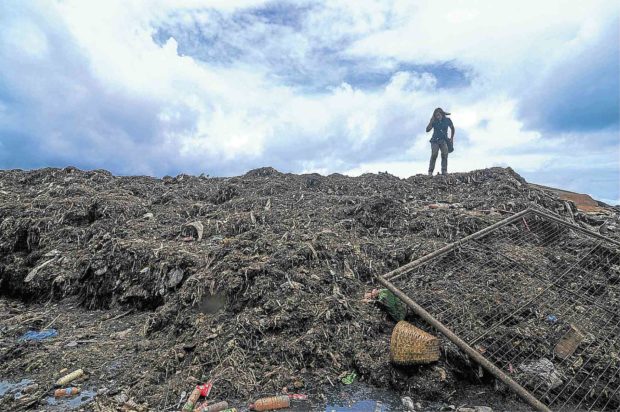
TRASH MOUNTAIN The biodegradable waste generated by residents in Baguio City may be converted into electricity and methane gas using a Japanese waste-to-energy technology. —KARLSTON LAPNITEN
BAGUIO CITY — The 400 metric tons of garbage generated each day by 350,000 residents here may be converted into electricity and methane gas for household heating and fertilizer, using a Japanese waste-to-energy technology, which Malacañang wants to pilot in the city.
As most populations grow, monetizing mixed garbage by using it as fuel for electricity generation is a direction being taken by many world economies, according to officials of Toyo Energy Solution Co. Ltd. who pitched their technology to Mayor Benjamin Magalong on Friday.
Magalong said the group was referred by the Department of Energy after President Duterte’s recent state visit to Japan.
Under a government-to-government arrangement, the company will customize its system to the terrain and type of waste generated by residents “at no cost to Baguio,” Magalong said.
Around 40 percent of Baguio’s waste is biodegradable, with 17 tons generated daily by the city public market. The waste is moist because of frequent rains, which would make biomass generation more efficient for a prototype plant, said the Japanese team led by Toyo Energy president, Yoshimitsu Okada.
No burning
Unlike conventional waste-to-energy systems that produce electricity by processing garbage through thermal combustion, the Toyo system draws out methane gas from pulped waste to fuel power generators.
“So there will be no burning,” the team assured members of Zero Waste Coalition who joined the meeting.
The Japanese engineers said their renewable energy system could also be used to treat wastewater, sell byproducts of the methane fermentation as fertilizer and distribute charcoal bricks made from residual waste.
The city government can put up a prototype plant at a 13-hectare section of an open pit mine in Itogon town, Benguet province, where it earlier proposed to set up a technological hub for treating waste, or at a donated lot near Mt. Sto. Tomas.
Methane fermentation
Toyo has developed methane fermentation and gasification plants near factories in countries like Indonesia. In Japan, which has strict environmental regulations, Toyo built the methane plants in farmlands.
But the technology, operated in heavy containment shells, has also been operated near residential areas, the Japanese engineers said.
They said 55 percent of gas produced from garbage is methane, which could be used for cooking like natural gas, or power up generators, while 45 percent is carbon dioxide.
Electricity can be sold to the Luzon grid. Baguio, which is securing a license to generate power, owns four hydroelectric plants which used to be operated by an Aboitiz company.
At present, Baguio is turning its biodegradable waste into fertilizer using two machines introduced by another Japanese company in 2010. The system converts organic waste into powdered fertilizer with the use of a microorganism called “shimose.”
But operators of the machines have not been following the technology’s original design, resulting in breakdowns in the generation of sludge, Magalong said.